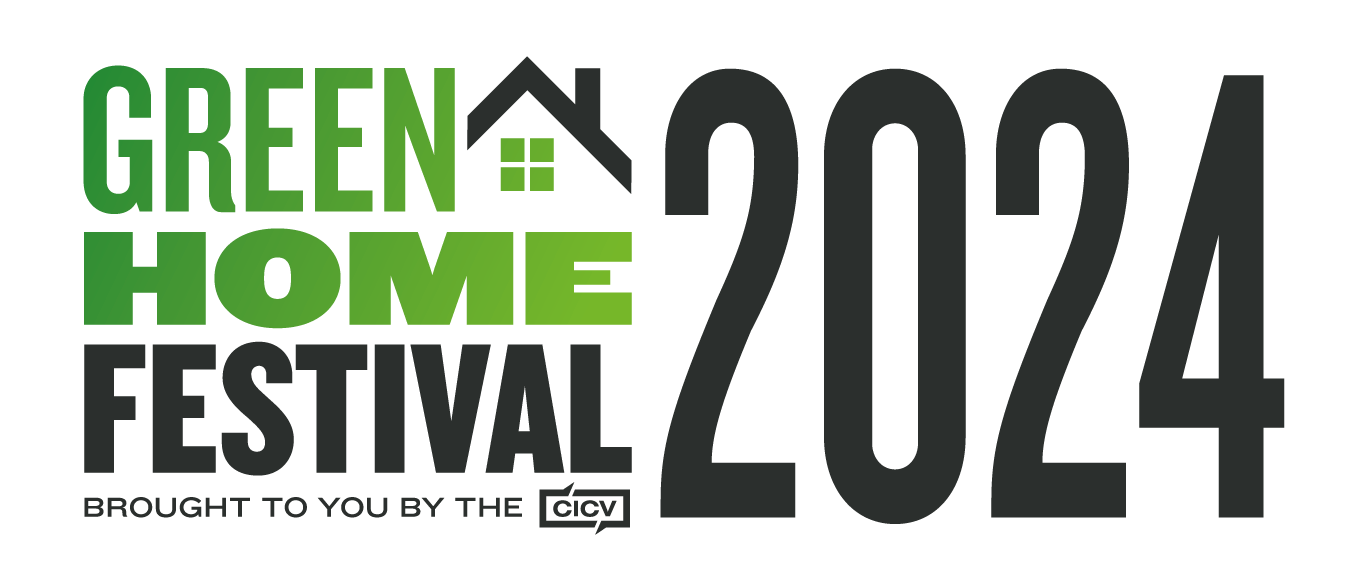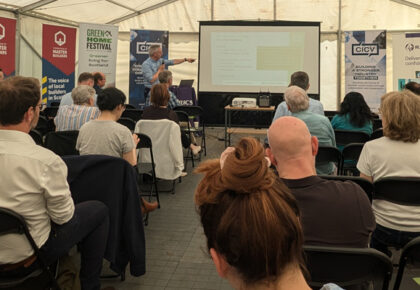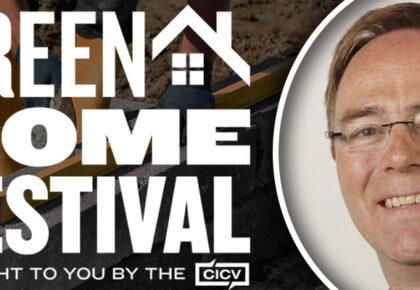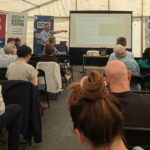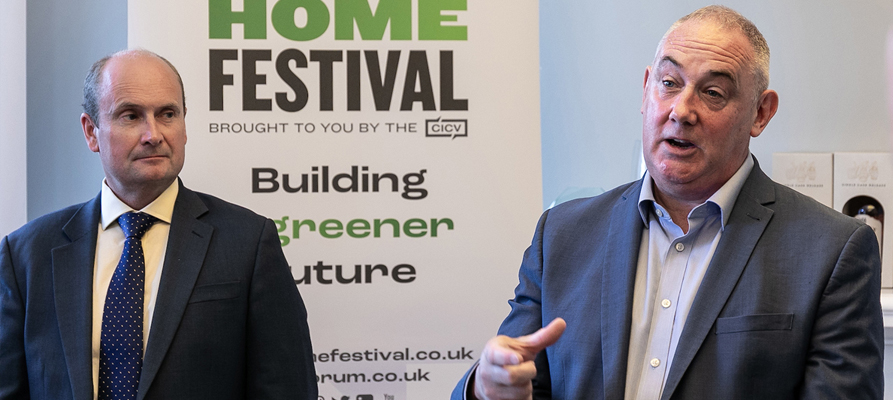
Climate change is the “defining issue of our time” and we all have a role to play to ensure we successfully transition to net zero in Scotland.
That was the message from Minister of Housing Paul McLennan this week as he officially opened the second Green Home Festival as part of the 2023 Edinburgh Festival Fringe.
The MSP was the keynote speaker at the launch of the five-day renewables jamboree in central Edinburgh on Monday, which was once again organised by the Construction Industry Collective Voice (CICV).
Mr McLennan was joined by TV presenter and award-winning designer Anna Campbell-Jones for the launch event at 10 Charlotte Square, where guests gathered to kick off a week of practical assistance and advice to help Scotland become a net zero nation.
Speaking to delegates at the Scottish headquarters of the Royal Institution of Chartered Surveyors (RICS), Mr McLennan outlined the challenge facing industry and homeowners – and said everyone had a part to play.
The Minister told guests: “Climate change is the defining issue of our time; the climate emergency is already here and we know that we have to act for our generation and also for future generations.
“We know that to meet Scotland’s climate targets we need to reduce emissions from heating buildings by 68% by 2030, which is a huge task. We also need to switch homes and buildings to zero direct emissions heating, such as heat pumps and heat networks.
“The cost of living crisis and unprecedented surges in energy prices make this challenge even harder, as do the impacts of rising inflation on building and construction costs.
“But these factors make it even more important to move away from expensive fossil fuels for heating our homes – to help make our energy more affordable and secure, while eliminating energy efficiency as a driver of fuel poverty.”
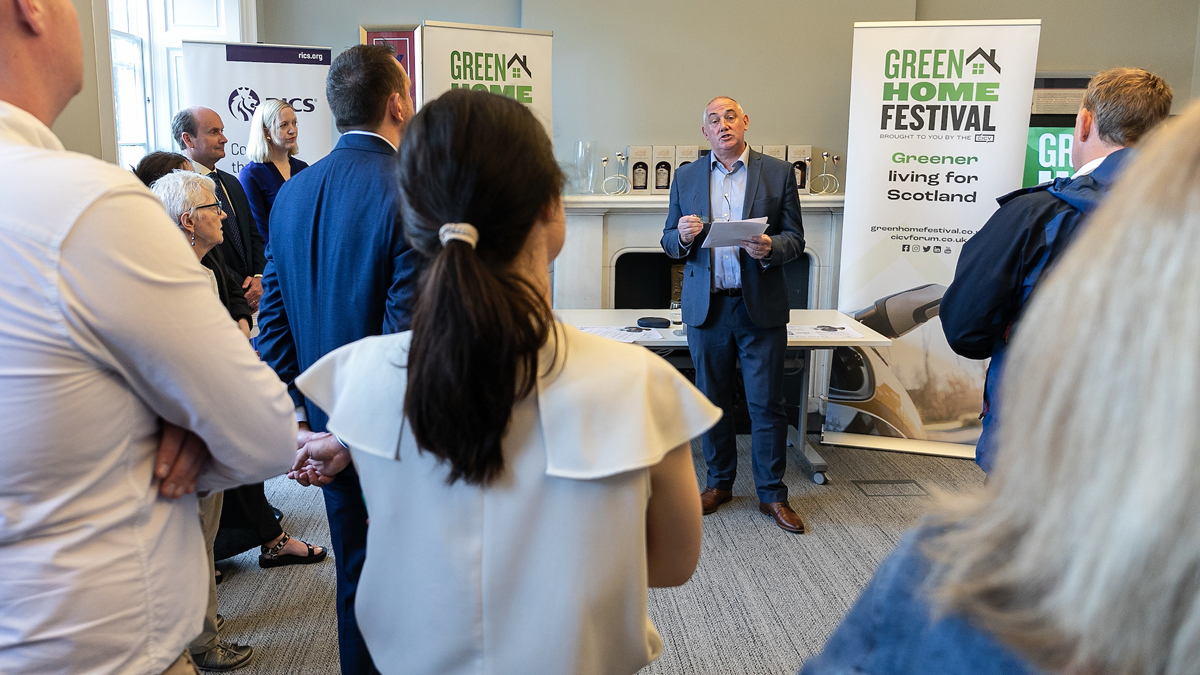
Paul McLennan addresses delegates at the launch of the Green Home Festival in Edinburgh on Monday 14 August
Mr McLennan, who is MSP for East Lothian, also stressed that increasing understanding and raising awareness about the changes we need to see are key to Scotland reducing emissions from our building stock.
The Minister said: “We need to help homes, businesses and other property owners to understand what the heat transition will mean for them, the types of measures best suited to their homes and buildings and the support available to them to make this transition.
“We plan to publish a Heat in Buildings Public Engagement Strategy later this year, setting out our plan to increase understanding of the heat transition in Scotland.
“Many of you in industry, the public and third sectors are already taking the lead in the heat transition by decarbonising your own buildings.
“Events such as the Green Home Festival – offering live demonstrations and guidance – can play a huge part in increasing understanding of the changes we need to see in our building stock and of zero emissions heating systems in Scotland.”
Mr McLennan also said that the Scottish Government continues to offer a “coordinated package of support” to help householders convert to zero direct emissions heating systems and install energy efficiency measures.
He said: “We know that installing a zero direct emission heating system and energy efficiency measures can be expensive and we understand the importance of helping people to meet these costs, especially those who need support the most.
“The Home Energy Scotland Grant and Loan Scheme provides grants of up to £7,500 for homeowners to install both heat and energy efficiency measures, and as much again in loan funding.
“There are also higher grants for eligible properties in rural areas and we are committed to investing at least £1.8 billion over the course of this Parliament towards heat and energy efficiency measures.”
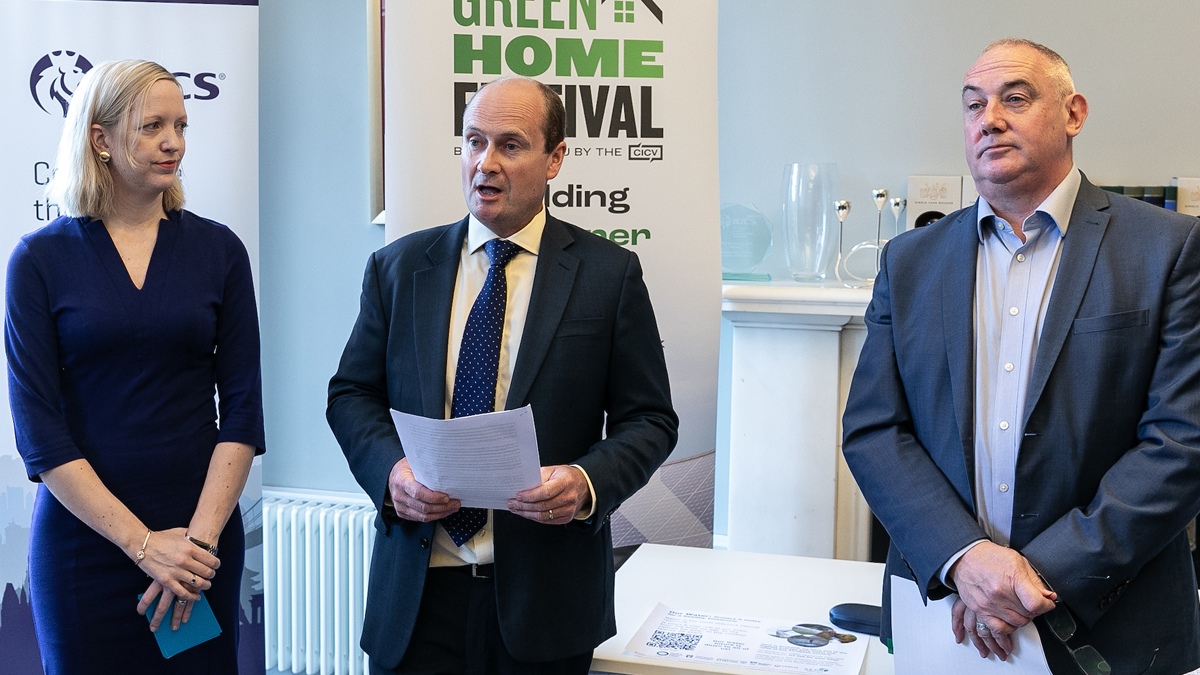
Sandra Cummings, Gordon Nelson and Paul McLennan at the event launch
Mr McLennan added: “Public funding and support will continue to play a big part in helping people make the changes needed. But it will cost around £33 billion to transform our building stock by 2045 and that can’t be met by government alone.
“Our Green Heat Finance Taskforce will therefore make recommendations this year on how the financial services sector can help people meet and spread the costs of the heat transition.
“And our £17.6m Green Heat Innovation Support programme will support Scottish-based companies to develop ideas, introduce new products or processes to the market, and support collaboration.”
Other speakers at the launch included Green Home Festival co-organiser Gordon Nelson, Scotland Director of the Federation of Master Builders, and Sandra Cummings, Chair of the RICS Scotland Board.
Mr Nelson said: “We were extremely grateful to Mr McLennan for opening the second Green Home Festival and kicking off a fantastic week of essential advice and practical hands-on information.
“Once again it has been heartening to be involved in a wider team effort, working with kindred organisations and highly skilled people in planning this year’s festival which will promote the construction sector’s commitment to accessible, affordable, and sustainable low-carbon energy solutions.
“Through influencing government policy, the CICV will aspire to realise its vision of building a sustainable future, one home at a time.”
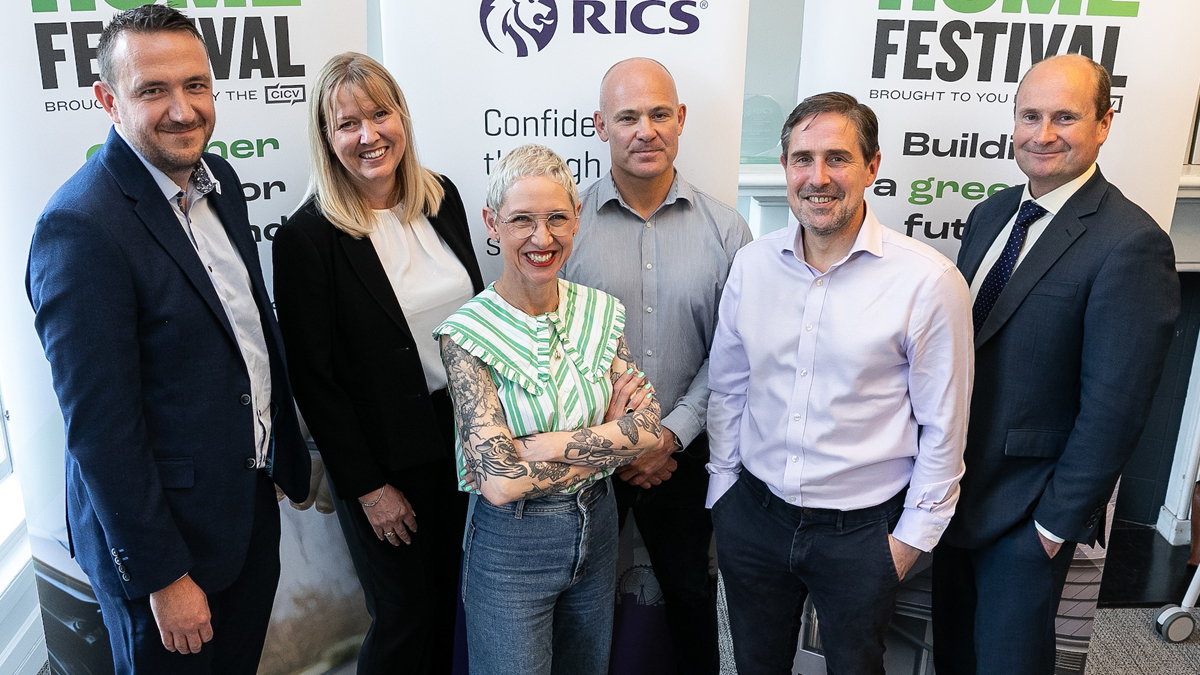
TV presenter Anne Campbell-Jones (centre) was among the presenters at the first show on greener kitchens
After the launch, Scotland’s Home of the Year judge Anna took centre stage for the first show of the day, Ingredients for a Greener Kitchen, which showed homeowners how to make their cooking spaces more eco-friendly, with contributions from Scottish Water and trade bodies SNIPEF and SELECT.
The show was followed by a second session on the potential of microwave heating, in which Professor Sean Smith from the University of Edinburgh outlined the features and benefits of the alternative heat source.
The Green Home Festival is delivering a further eight in-person and virtual presentations this week, targeting homeowners, construction professionals, housing associations, landlords and local authorities.
With demonstrations and hands-on guidance to help people reduce their carbon footprint and become more energy efficient, topics covered include green garden rooms and offices, making retrofit projects eco-friendly, converting churches and how the home of the future will be powered.
The event also includes a dedicated heat pump day, with two separate shows on how to reduce bills, access grants and install the technology, as well as options for hybrid heating.
Built Environment – Smarter Transformation also hosted an in-person show on the advantages of community heat networks and a webinar that advised what consumers can do to reduce both their energy consumption and energy bills.
The festival is the latest in a string of practical and constructive initiatives launched by the CICV since its creation at the start of the pandemic in March 2020.
Made up of 28 trade associations, professional services bodies and companies, it has maintained a steady supply of information and practical advice to the sector as well as carrying out surveys, producing animations and posters, hosting webinars and maintaining close dialogue with government.
- Full details, including how to book tickets for each event, are available here
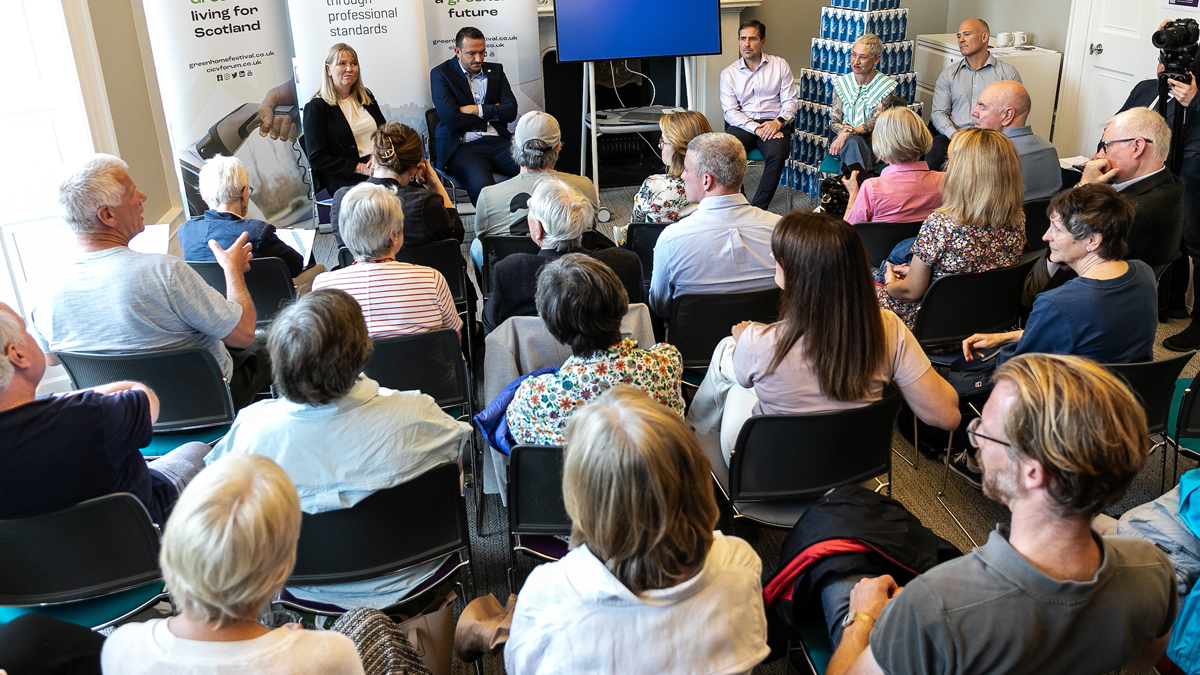
The first kitchen show saw a full house at Charlotte Square in Edinburgh
